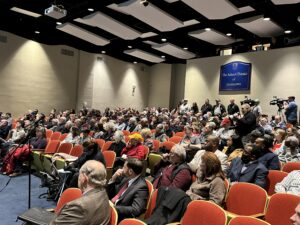About 200 Jenkintown residents turned out Monday for a sometimes contentious meeting over whether the community should shut down its police department and contract with neighboring Abington or Cheltenham for police services.
Officials emphasized that no decision has been made. The police department costs the borough $2.5 million, about half its $5.1 million annual budget.
Most of those who spoke to the borough council and Mayor Gabriel Lerman vehemently opposed the idea of losing the 11-person department. Many residents were surprised to learn of financial issues that depleted the municipality’s reserve fund, which police Chief Tom Scott outlined during a slide presentation that kicked off the two-hour meeting. He also noted the police union contract expired on Dec. 31, and the union representatives “stopped negotiations and walked away from the table.”
Scott said he started the conversation, “Because I care. I care about the community, and I care about our officers.”
A 2020 report by a police consultant found 90 issues with the department. Scott has tried to remedy some of those, such as a lack of active shooter response training, since he became chief in 2022.
One issue that decimated Jenkintown’s savings was a $800,000 settlement with Salem Baptist Church after Jenkintown condemned some land behind it in 1998. The church fought the action, and the matter spent years in the courts until the 2015 settlement. Also, a tax settlement with a commercial property owner requires the borough to spend $92,000 yearly for five years. And a $190,000 court-ordered tax reassessment in 2023 for a business that Jenkintown will pay over two years is another factor.
Real estate taxes have increased 28 percent for the last three years, and the tax millage has doubled over the past five years. Jenkintown residents pay the second-highest tax rate in Montgomery County, behind Cheltenham.
Lerman said many small businesses have not re-opened since they were closed during the pandemic. However, residents pointed out that a new Giant supermarket is under construction on Old York Road and will be paying taxes.
The school district receives the entire earned income tax amount rather than half because officials believe it’s the town’s most important asset and a major draw for new residents. Other expenses include purchasing new fire apparatus, $20 million for sewer repairs, and wage increases for public services workers, which are now much lower than surrounding towns.
Reed Virgilio has lived in Jenkintown for 18 years and wants to keep the police force.
“My son got into a scenario with the police,” she said. “And the police, because they knew us like we knew them, treated my son with the utmost respect when a lot of other places wouldn’t, with his skin color and braids and dreads. I know it would have been different because I know what is out there. I think we’ve got the best police force.
“If we get rid of the police department, our taxes aren’t going to go down at all, so where’s that money going to go to?” she asked, to mixed hoots and applause.
“Our response time would go down 100 percent,” said Virgilio. Scott disagreed.
Council President Jay Conners said, “The amount of money we’d be able to save is just enormous. It exceeds $500,000. “
Joe Stanton, who’s lived in Jenkintown for 71 years and has a law office in town, also does not want to lose the police department.
“The officers of Jenkintown know the town well,” said Stanton. “They know the streets, the fields, the homes, the businesses, and most of all, they know the residents of this town.” The officers have prevented burglaries, robberies, and vandalism.
Officials haven’t spoken to neighboring communities, but they did talk to a public relations firm last spring to help them speak to the public about the issue.
“You are aware of this situation because it was leaked to the press,” said Conners. That revelation also drew outrage from some people, who said officials weren’t transparent.
Resident Janet Jones said, “I would like to see better management of the funds and what’s going on.”
Michael Gottlieb, an attorney, said that if the department closes, the former officers would struggle to find other jobs in law enforcement due to their seniority. And, he added, Jenkintown’s average officers’ pay of $126,000 “isn’t all that great compared with comparable municipalities.”
“These officers put their lives on the line every day for the good people here to make sure they have a safe place to live,” Gottlieb said. “Take a look at the videos that are coming from ‘Filthadelphia.’ There’s a war on police officers in Philadelphia.”
Another man pointed out the rising crime rate in Philadelphia and said he feared criminals would come out to Jenkintown if it no longer has its police department.
Joe Regan, president of the Pennsylvania Fraternal Order of Police, said there was a similar situation 15 years ago with Narberth Borough and Lower Merion Township, but Narberth kept its police force.
“Jenkintown officers are members of our organization. You’re talking about 10 lives. But you have to multiply that to their family members. It all comes as a cost,” said Regan. He told the residents to keep fighting for their police department and to contact former Narberth council folks, including Mary Jo Daley, a state representative, to find out why they kept their department.
“Communities lose their identities when they lose their police force,” Regan told DVJournal.

